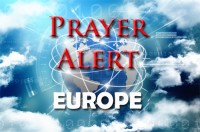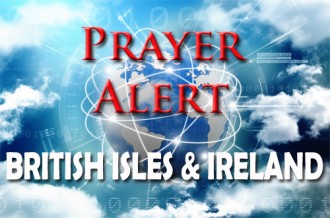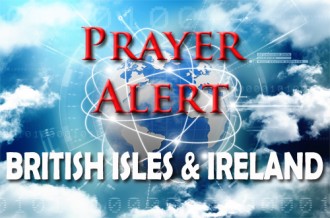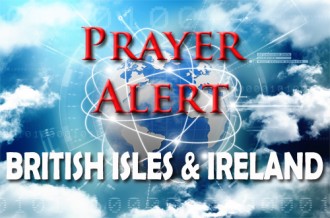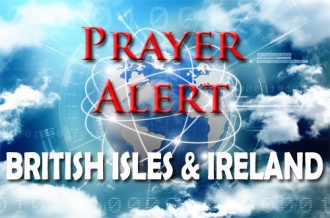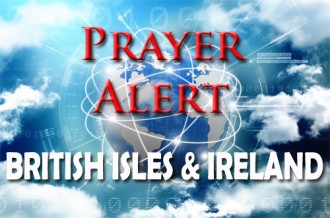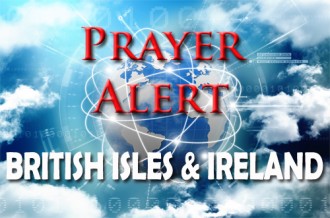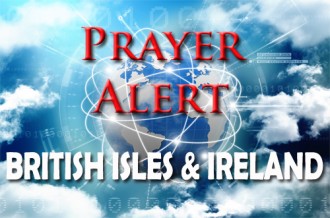Israel: IS threatens Christians in Jerusalem
Arabic leaflets have appeared in Jerusalem, issued by an IS-aligned group, telling Christians they must flee Jerusalem by the end of Ramadan (18 July) - or they will be slaughtered. The threat comes as IS and Hamas engage in a struggle for the allegiance of Palestinian Muslims. Religious tensions are rising across Israel, and Christians are being attacked by Jewish ultra-nationalists and radicalised Muslims. Some are wondering if Christians have a future in Israel. The Israeli government has condemned the violence against Christians as 'an attack on us all' and affirmed Israel's commitment to religious liberty and the rule of law. Please pray for Israel and its Christians. Please pray that God will guide and assist the Israeli government and security forces, that they will protect Christians from Jewish ultra-nationalists and the far more dangerous IS-incited and organised militant Muslims. For the full story click the ‘more’ button below.
Church planting throughout Europe
European Christian Mission (ECM) has a mission to plant and develop churches throughout Europe because only through loving communities can Europe really experience transformational change.For centuries the centre of Christendom has been in Europe but now Europe is the only continent where Christianity is in decline. Many years of secularisation, immigration and rising standards of living have replaced faith in God with a multiplicity of different beliefs and lifestyles. Europe has become a complex, multicultural and multireligious continent, a continent full of challenges. However, God continues to work through these challenges, and His light still shines in Europe. ECM believes that church planting is the strategy to transform Europe. God has chosen the Church as His instrument to reach the whole world with His Gospel of salvation.
Greek Orthodox Church opposes atheist Prime Minister
Greeks voted to decide whether they should stay in the eurozone, risking severe austerity in return for an international bailout. Leaders of the influential Orthodox Church urged a ‘yes’ vote, going against the nation's first openly atheist Prime Minister Alexis Tsipras. Greece has closed its banks and failed to repay the IMF after the end of its bailout programme. Analysts say, ‘If Greece quits the eurozone they could face a major financial crisis’. The head of the Orthodox Church said, ‘The times we are living in are the most crucial ones since World War Two.’ The Church, which has helped Greek society at the time of suffering due to the austerity measures in the recent years, also fears that an exit will worsen the humanitarian crisis.
‘Freedom of religion should be a cornerstone of the West’
National newspaper columnist Tim Montgomerie has criticised Britain’s increasingly secular society. Writing in The Times he said, ‘I want less vacuous talk of fairness, tolerance and generosity from our politicians. Let’s start getting specific about what we mean by ‘British values’. Freedom of religion should be a cornerstone of western belief and it must stand as a contrast to the many Islamic states where apostasy is punishable by death. Also do we really want to be a society that seems indifferent to 200,000 abortions every year but can’t find room for faith schools? Or a popular culture that celebrates getting blind drunk on the weekend but wants to compel a church charity to employ non-believers?’ Montgomerie pointed to John Newton: ‘Few people in history can have had a greater appreciation of the power of God’s forgiveness than John Newton, who wrote ‘Amazing Grace’ and encouraged Wilberforce to end the slave trade, not to leave politics after becoming a Christian. See also THE MILL GATHERING STATEMENT at http://wpc.wpengine.netdna-cdn.com/wp-content/uploads/2015/04/The-Mill-Statement-Apr-2015.pdf
Northern Ireland takes further steps to tackle obesity
Overweight and obesity are risk factors for many long-term health conditions and there are too many Northern Ireland people whose weight may contribute towards their ill health. On Monday Health Minister Simon Hamilton pledged to tackle obesity in Northern Ireland following the updated publication of 'A Fitter Future for All 2012-2022'. The steering group of the ten-year strategy for addressing obesity reviewed the outcomes after the first three years. Government departments, agencies, and partners will now promote the following: a) Child carers' attendance at ‘Nutrition Matters for the Early Years’ training will be a requirement for registration. b) Councils must have a play and leisure policy and action plans in place. c) Increased opportunities for play / physical activity for the young must be provided, particularly in deprived areas, and also workplace physical activity schemes.
Scotland’s Sunday school survey
The Free Church of Scotland’s Youth Committee has published a report from the denomination’s largest-ever Sunday school survey. Entitled ‘Pointing to Jesus’, the committee wants to help Sunday schools and other youth groups point children to Jesus Christ as their personal Saviour. The report intends to equip teachers with new ideas to connect the never-changing message of the Bible to the ever-changing world in which the children of this generation are growing up. Every Sunday there are over 1,100 children attending, with numbers virtually the same over the past five years (nominally up). The Mission Board chairman said, ‘Transitioning children from Sunday school attenders to those who are part of the worshipping congregation is absolutely vital. The last thing we want is for children to reach the end of their time in Sunday school with an inability, through lack of exposure, to sit through church services.’
Number of young homeless is 'more than three times the official figures'
The true number of young people who are homeless far exceeds government figures, according to a major new study by housing experts at Cambridge University being released on Monday. Some 83,000 homeless young people have had to rely on councils and charities for a roof over their heads during the past year - more than three times the 26,852 young people recorded in homeless figures released by the Department for Communities and Local Government. There are 35,000 young people in homeless accommodation at any one time across Britain. The research said, ‘The worryingly high levels of young people using homelessness services across Britain is a minimum estimate, and it is likely that in reality there are more homeless young people accessing support across the UK’. The study was commissioned by Centrepoint and comes amid warnings that Britain is heading for a housing crisis.
Keeping Sunday special - back on the agenda
George Osborne has announced an 'Enterprise bill' for the autumn which will include provisions for handing over decisions about Sunday trading rules to local mayors and councils. It's out for consultation. Our society still has one day when families can have more time together on a day that's theirs, instead of one of them having to work, and when law acknowledges ‘profit isn't everything’. Currently large stores can only open on Sundays for six hours (a concession won by campaigners against the liberalisation of Sunday trading laws in 1994). This means small family-run shops have some protection against the march of the megastores. It means that for those who have to work, days can be shorter. It means that communities in busy shopping districts have time to recover and to breathe before they're hit by waves of consumers again. See also THE MILL GATHERING STATEMENT at http://wpc.wpengine.netdna-cdn.com/wp-content/uploads/2015/04/The-Mill-Statement-Apr-2015.pdf
Outreach to Muslims
Horizons International, Frontiers, Mahabba and Marathana are just four of the many organisations God is using to develop Christian outreach initiatives into Muslim communities in the UK. God wants all the nations to know Christ, and He has brought thousands upon thousands of Muslims from a variety of nations to our doorstep in recent years. Now Christians are learning to interact and share their faith through friendship evangelism with these immigrants. Christians are learning through various teaching models how to empower their witness to Muslim neighbours, work colleagues, and fellow-students in schools. See also http://www.engagecourse.org/
IS has declared war on Britain
On BBC Radio Four's Today programme David Cameron said that IS had declared war on us; we are being attacked at home and abroad whether we like it or not, and there are people in Iraq and Syria who are plotting to carry out terrible acts in Britain and elsewhere. He said it wasn't enough to ‘destroy them at source’ - we have to deal with the radical narrative taking over the minds of young people. Clifford Hill in Prophecy Today said we cannot defeat an ideology by weapons of war, it can only be successfully tackled with a more powerful and compelling counter-ideology. He reminds us that the Qu’ran 5:37 says that those who cause corruption in the land should be killed or crucified. However, Jesus said, ‘love your enemies and pray for those who persecute you.’(Matthew 5:43). (See article 2 below)



